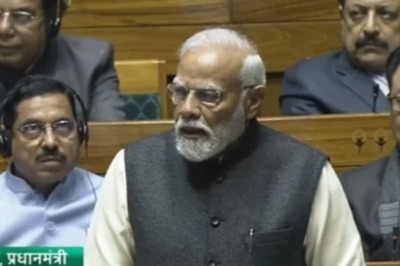
views
The Senate Intelligence Committee hearings proved to be a bit of a blow hot and blow cold sort of an affair. The expectation among the Members of the Congress was that Facebook, Twitter and Google would turn up to testify at the “Foreign Influence Operations and Their Use of Social Media Platforms” hearing in Capitol Hill. What happened instead was the Facebook and Twitter showed up, whereas Google sat back and decided to not attend. That didn’t please the lawmakers, who instead made sure of that representation with an empty chair.
"I'm disappointed Google decided against sending the right senior level executive," said Sen. Richard Burr (Rep-N.C.). “There's an empty chair next to you from Google and they're not here today, and maybe it's because they’re arrogant,” said Sen. Marco Rubio (R-Fla.). After declining any potential appearances by Alphabet Inc. CEO Larry Page and Google CEO Sundar Pichai, the company had offered to instead send its chief legal officer, Kent Walker. However, the committee declined. Perhaps, the entire idea was to hear from senior leadership at the tech companies who are making the decisions.
Once chastising Google for its non-appearance was done with, matters moved on to Facebook and Twitter. Sheryl Sandberg, Facebook Inc.’s billionaire chief operating officer, and Jack Dorsey, Twitter Inc.’s chief executive appeared before the Senate Intelligence Committee. Both companies tried to put their best foot forward, to perhaps soften the perception that Silicon Valley is unable to control the spread of hate speech online, data privacy breaches and online efforts by various parties to alter the political scenario of another country.
Twitter’s Dorsey said that the company’s objective was to "We want to be a global town square, where people from around the world come together in an open and free exchange of ideas." He mentioned that Twitter recently developed and launched more than 30 policy and product changes designed to foster information integrity and protect the people who use our service from abuse and malicious automation. Twitter has made a number of improvements specifically in preparation the 2018 election. This includes further development of detection tools that identify suspicious account activity, such as exceptionally high-volume Tweeting with the same hashtag or mentioning the same “@handle” without a reply from the account being addressed, the creation of an internal cross-functional analytical team whose mission is to monitor site and platform integrity and a political conversations dashboard which will identify sudden shifts in sentiment around a specific conversation, suggesting a potential coordinated campaign of activity, as well as information about groups of potentially linked accounts that are posting about the same topic. Dorsey did admit that platform’s application of rules has been inconsistent off late, and said, “I believe if you went through our rules today and sat down with a cup of coffee, you wouldn’t be able to understand them.” That was perhaps an admittance that Twitter was many be underprepared or didn’t expect the misinformation campaign to become this powerful on the platform. Dorsey however said that the platform was automatically preventing around 500,000 bot accounts from logging in every day.
Facebook COO Sheryl Sandberg echoed similar sentiments. We were too slow to spot this and too slow to act. That is on us,” she said on the issue of the platform being used by entities to interfere with the US elections. However, she did add, “We’re getting better at finding and stopping our opponents.” Sandberg also mentioned that Facebook has implemented a mix of automated systems and human moderators who are reviewing ads on the platform, which is very important for political advertising. She however did say, “We have more than doubled the number of people working on safety and security and now have over 20,000. We review reports in over 50 languages, 24 hours a day. Better machine learning technology and artificial intelligence have also enabled us to be much more proactive in identifying abuse.” Facebook has disabled 1.27 billion fake accounts between October 2017 and March 2018 and removed 836 million pieces of spam in the first quarter of 2018
Twitter shares fell 6 percent after Dorsey testified, while Facebook shares declined 2.3 percent.
This has been a rather tough summer for Google. In July, the European Union asked the company to pay a $5 billion fine for anti-trust abuse of its Android operating system for smartphones. Last month, Google faced criticism, including from its own employees, after plans that it was potentially working on a search app for China to deliver censored search results, came to light. The company has also faced criticism from US President Donald Trump, who has accused Google of altering search results. Perhaps those could have been uncomfortable questions for Google, at the hearing.
Also read: Silicon Valley Set to Have Its Next Big Conversation With The US Congress




















Comments
0 comment